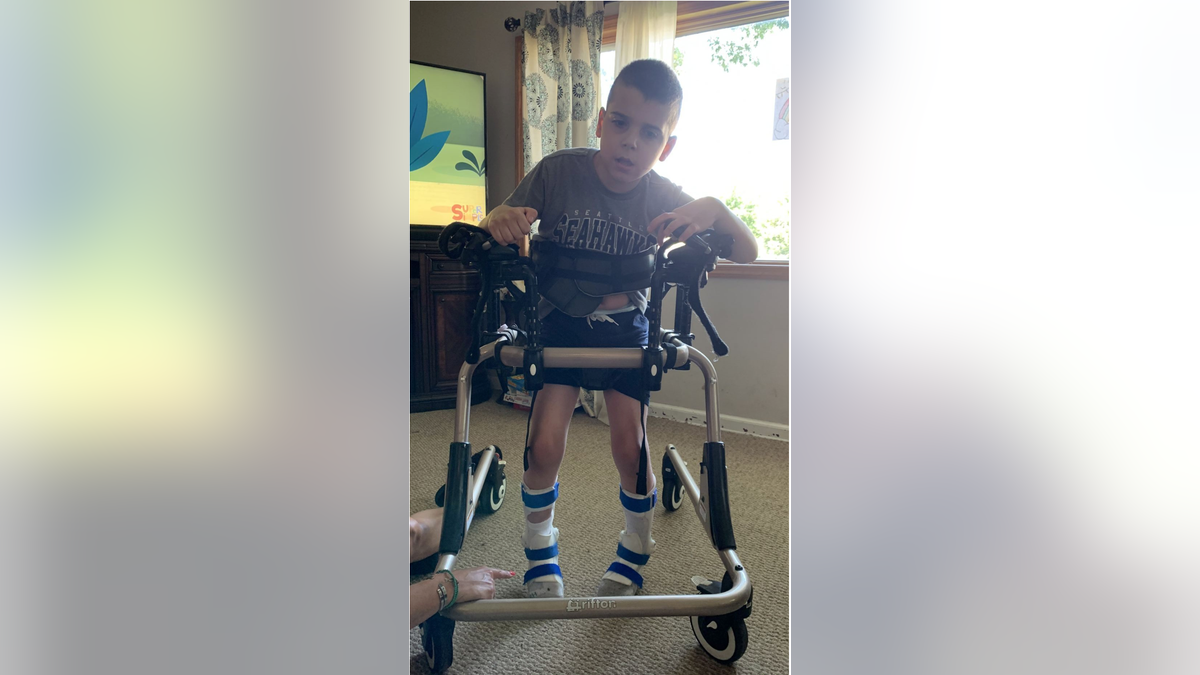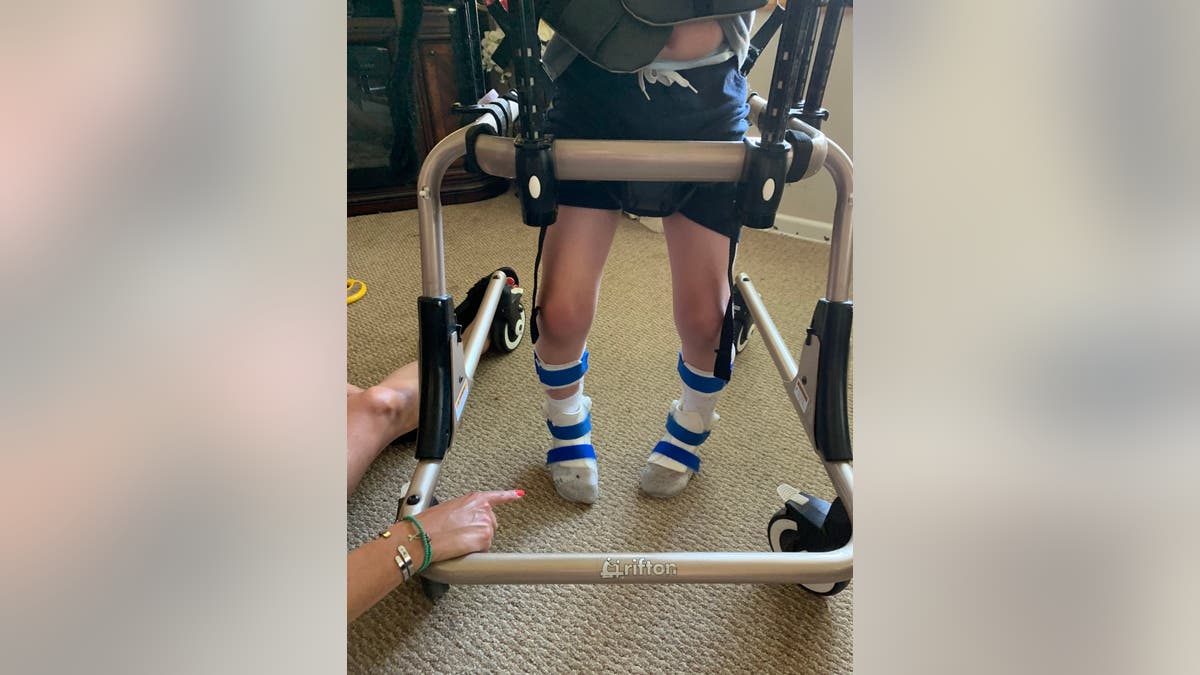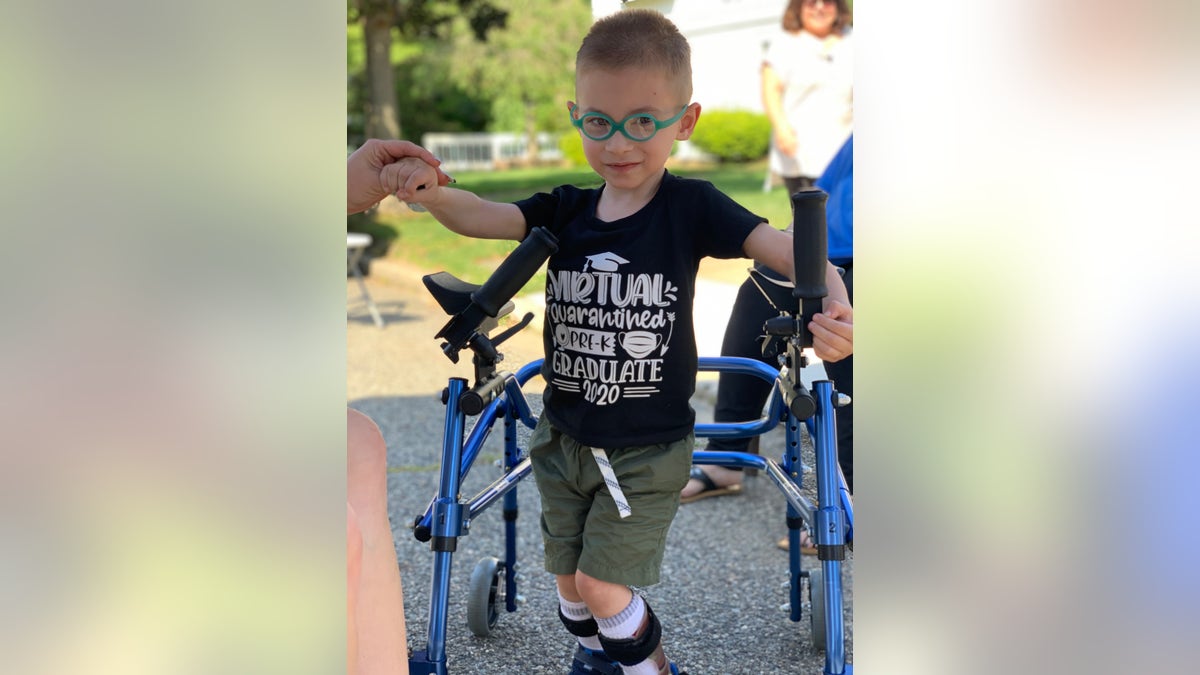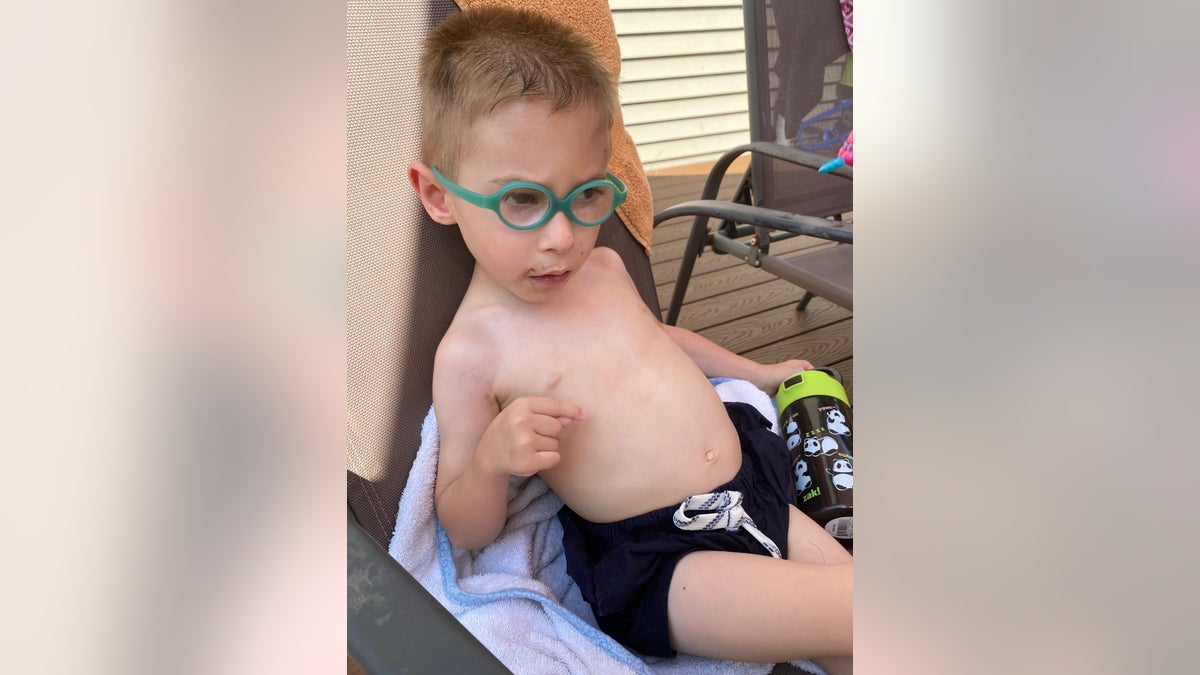Fox News Flash top headlines for August 4
Fox News Flash top headlines are here. Check out what's clicking on Foxnews.com.
Christopher Heisel of Long Island, N.Y., was once able to take 30 steps with help from his gait trainer. The child, who suffers from cerebral palsy, could sit up on his own and feed himself.
Due to the closure of in-person therapies amid the coronavirus pandemic, however, Christopher, 10, can no longer bear any weight on his legs. Little to no wrist strength has left him unable to hold a spoon.
“This has been a very difficult situation for him, the regression is so devastating and it’s just been so much within such a short amount of time,” his mother, Kristy Heisel, told Fox News. “All the work we have done is gone.”

Christopher Heisel, 10, who suffers from cerebral palsy, can no longer bear any weight on his legs after in-person therapies closed amid the pandemic. (Photo courtesy of Kristy Heisel, Jamie Scalise)
Occupational and physical therapy, as well as speech, hearing, and vision services, turned to teletherapy, Zoom sessions, and email during the pandemic. But these methods may not suffice for disabled children who thrive on in-person therapy and rigid routines.
Professors at the University of Nevada, Reno (UNR) recently detailed the importance of routine and structure for children with disabilities.
“When kids have predictable routines, problem behaviors are less likely,” according to UNR's MaryAnn Demchak, professor of special education and disability studies, and Chevonne Sutter, project coordinator for the Nevada Dual Sensory Impairment Project. “Problem behaviors are sometimes a way for children with disabilities to communicate their frustration or tell their parents what they want."
A group of parents across Long Island recently shared with Fox News accounts of their disabled children’s regression and their growing frustration amid the closure of in-person services.

Christopher Heisel, 10, suffers from cerebral palsy and can no longer bear any weight on his legs. (Photo courtesy of Danielle Spina, Jamie Scalise)
A community of more than 1,000 concerned parents and individuals have assembled through a Facebook group called “Make IDEAs Happen NY" after the co-administrators, Jamie Scalise, a student at St. Joseph’s College in Patchogue, and Kerri Faithfull, whose son suffers from a speech disorder known as childhood apraxia of speech (CAS), set out to make a change, conducting surveys and writing letters to local and state elected officials. But Scalise claims that the group has yet to receive a response.
The group is advocating for a full return of one-on-one services such as physical and occupational therapy as well as speech, hearing, vision, and eating therapies. These therapies are mandated by special needs students' individualized education programs (IEPs) through New York State.
CORONAVIRUS IN THE US: STATE-BY-STATE BREAKDOWN
The group is not calling for a full reopening of schools for all students due to the possible health risks of doing so, they said.
Gov. Cuomo’s New York on PAUSE executive order, issued March 22, brought sweeping closures for nonessential businesses and schools statewide. On June 5, Cuomo signed an order allowing public school districts to offer in-person special education services for the 2020 summer term if they could do so safely.
“Notwithstanding any prior Executive Order to the contrary, special education services, and instruction required under Federal, state or local laws, rules, or regulations, may be provided in person for the summer term in school districts. Any district providing such services in person must follow State and Federal guidance,” the order states.
Overall, New York has come a long way from the onset of the pandemic; New York City was once considered the country’s epicenter. But as Long Island, in particular, moved through the various phases of reopening, including many personal services like barbershops and nail salons, many parents with disabled children remained at home as teletherapy continued.
“We feel like these kids were kind of lost in a loophole where people just forgot about their needs, which are more essential than any of those that we just listed [such as barbershops],” Matthew Ratto told Fox News. Ratto's 2-year-old daughter, Margaret, suffers from cerebral palsy.

Lucas Spina, 5, suffered a stroke upon birth at 28 weeks and has undergone many surgeries, with more to come. Amid the pandemic, the child is struggling to walk without proper therapy. (Photo courtesy of Danielle Spina, Jamie Scalise)
A call to the governor's office about the parents' concerns was referred to New York’s Office for People with Developmental Disabilities (OPWDD). On July 15, the OPWDD announced new guidelines allowing the resumption of home visits, community outings, and day habilitation services for regions of the state that entered into Phase 4 of Cuomo’s New York Forward Reopening Plan. However, day habilitation services are only for special needs individuals over the age of 21.
2ND US VIRUS SURGE HITS PLATEAU, BUT FEW EXPERTS CELEBRATE
“OPWDD has taken the threat of COVID-19 to the people we support very seriously and immediately paused congregate in-person day services at the onset of the public health emergency to limit the spread of the virus, replacing them wherever possible with virtual services and direct services provided in smaller residential settings,” Jennifer O’Sullivan, OPWDD spokesperson, wrote in an email statement to Fox News.
Scalise said to Fox News: “Unfortunately, although day facilities have been able to reopen as of July 15, school-aged children are not impacted by this decision."
She called the order “vague" and added that it left out a majority of special education students without in-person education and related services.
Scalise estimated that more than 75 percent of kids part of the Make IDEAS Happen NY are still not receiving in-person therapy, though some parents in the group took matters into their own hands, managing to get some in-person therapy for their children through outpatient centers.
"We can't hold a governor accountable for knowing everything about every aspect of their job," Scalise continued. "We can't expect him to be exposed to children with such intense needs. We’re not placing blame, we’re just hoping to get traction and some attention toward this issue."
"We’re not placing blame, we’re just hoping to get traction and some attention toward this issue."
On July 31, all districts and schools in New York were required to provide reopening plans at the school level, posted on the schools' public websites, and required to have mandatory elements outlined in NYSED’s School Reopening Guidance Document.
This document requires schools and districts to provide “a free appropriate public education consistent with the need to protect the health and safety of students with disabilities and those providing special education and services…”
Scalise said: “Our continued fear is that in the case that schools reopen in the fall, an increased number of cases will lead to school closures once again, preventing our vulnerable population from receiving these services essential to their well-being and quality of life."
Kerri Faithfull, one of the co-administrators of Make IDEAS Happen NY, has a 4-year-old son, Lucas, who suffers from the speech disorder CAS. Before the pandemic, speech therapists at the private Opportunity Pre-School in Hauppauge worked with the child four times each week. These therapists are certified in PROMPT therapy, in which the therapist physically touches a person’s face to help make progress with speech.
When the pre-school remained closed during the pandemic, Faithfull removed the school's responsibility for the therapy sessions and sent her son to an outpatient agency instead. The services are covered by the school, though two of the four weekly sessions are provided as teletherapy.
"It kind of left it up to districts of schools," said Faithfull, speaking to Cuomo’s June 5 executive order.

Lucas Spina, 5, is regressing in his walking abilities amid the pandemic. (Photo courtesy of Danielle Spina, Jamie Scalise)
“I happen to be knowledgeable in the area, and so I knew that [an outpatient agency] was an option. Most parents did not realize that was an option. I don’t think most parents were able to make a decision like that,” Faithfull explained, adding that many school districts were unwilling to pay for a child to go to outpatient.
“While Lucas still has a long way to go and his speech therapist is very concerned about the lack of his vocal volume, as well as his number of sounds that he used to consistently say, at least he’s starting to get on the right track, wherewith most children who receive their services through school, that’s not the case,” she said.
Danielle Spina told a similar story. Spina said her 5-year-old son, also named Lucas, was born at 28 weeks and suffered a stroke upon birth which led to hydrocephalus, or water on the brain. A dozen brain surgeries followed, with more reconstructive surgeries yet to come, she claimed.
“I’m his mom, I’m not his therapist,” Spina said. “It’s easy to say, ‘Pick him up and make him walk.' But am I doing it the right way? Am I hurting him? Possibly, who knows.”









































